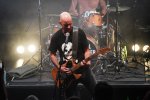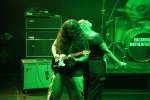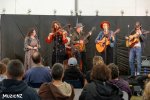King Cannons
Bio

Some bands talk their way into opportunities or use algorithms to feign blog hype. Others drag themselves up by the teeth.
In 2012, electrified soul-n-roll gang King Cannons arrive at their debut album, The Brightest Light, because tangled crowds of people shout their blistering choruses back to them in ramshackle band rooms. Because the band’s six members have fought poverty and hardship to stay together. Because there’s something to their songs that both reminds of rag street poets from days gone by and speaks the truth of everyday lives, heartache and boozy nights of the present.
To find the real beginning of King Cannons is to go back to the street corner where a ten-year-old Luke Yeoward struggled to wield the acoustic guitar handed down to him by his mother. With a hat at his feet, Yeoward played covers he’d picked up at home and school: Creedence Clearwater Revival, Neil Young and Cat Stevens, as well as primitive songs he’d written from the chords he knew.
As dusk set in, Yeoward would pack up the guitar and take his hat filled with coins down to the local music shop and empty its contents on the counter. One afternoon, after months of counting coins into the till, Yeoward walked out of that shop with an electric guitar and a practice amp to lug all the way home. His work had paid off, the way his father’s hours as a sawmill worker kept his small family under shelter.
It was with that guitar and determination that Yeoward started his first band at 13, going on to quit school and spend his nights hanging around dive venues while working days with his dad at the mill.
“I got my stripes through punk music,” Yeoward tells now as King Cannons’ imposing frontman and songwriter. “That’s how I learned to play, how I learned to write a song, with the punks I met and made bands with as a teenager.”
But it was also those punk bands that led Yeoward to an early musical crisis. With the money from his blue-collar labouring work going into bands that never made it beyond playing to their friends, Yeoward almost gave up on the lot.
“I was depressed and angry and I couldn’t figure out why I felt so sh*t all the time,” he says. “I wasn’t being honest with myself.”
At a screening of a documentary about rock icon Joe Strummer in 2007, Yeoward met guitarist Rob Ting and bass player Jonno Smith, and had a light-bulb moment. Just as Strummer had broken from his punk origins in The Clash to have a new musical outlook and career with The Mescaleros, Yeoward saw for the first time that he had new roads to walk.
“It was like a sign from the world that was saying: you can do something new and be yourself.” That night, Yeoward recruited Ting and Smith to a brand new project.
Flash forward a couple of years and the six members of King Cannons – all with the trademark crown tattoo, a sign of their commitment to the music and each other – had shacked up together in a very cramped house in Melbourne, Australia. Mattresses were moved to make space for living-room rehearsals that now incorporated sidling Jamaican percussion, honkytonk piano, deep-south gospel calls and the kind of anthemic melodies Bruce Springsteen kept in his back pocket as he paced New Jersey avenues.
With Yeoward’s bone-rattling yet unguarded voice at the fore, the band had become something altogether separate from what was happening around them, drawing larger crowds to their shows as whispers spread.
King Cannons’ self-titled EP, released in late 2010, showed what was on the horizon with live-recorded tracks ‘Take The Rock’ and ‘Teenage Dreams,’ the latter described by Yeoward as the most personal song he’d written up to that time.
On the lead up to the recording of the band’s debut album, Yeoward locked himself in the music room of his house and wrote every day for two months, landing the gang with over 50 tracks to work from. This time alone also had the impact of securing his lyrical vision for the record: for the band’s opening statement to the world, he would write songs for the grubby-faced friends of his childhood and the people who’d throw coins into his hat on the street. He’d write for the people he laboured with in the mills and worksites, and anyone who was fighting to make a better life.
And so begins one of The Brightest Light’s early hell-raisers, the massive shout through the industrial plains that is ‘Too Young’: “Sixteen, working in a factory/Breathing that dust five days a week…”
With Tom Larkin, drummer for the internationally known rock force Shihad, at the helm of the album’s recording inside Melbourne’s famed Sing Sing Studios, the intention was to capture King Cannons’ live sweat with the greatest production values.
“Whether it’s up-tempo rockin’ sort of songs or slower songs, our music is soul music,” Yeoward explains, “and if you try and record soul music in any other way than those people in a room together making that music, it just doesn’t translate.
“That’s how the six of us said we were going to make this record,” he continues. “It’s going to be performed in an honest way, and the songs are going to have integrity and, more importantly, when we’re in there doing it in the studio, our performance is going to have integrity. Otherwise it takes away from that basic ethos we forged right at the beginning.”
That ethos is what makes King Cannons the valiant underdogs of 2012 as their debut album is released internationally through Capitol Records/EMI.
Band Members:
Rob Ting (guitar)
Mikey Ting (keyboards, piano)
Jonno Smith (bass)
Lanae Eruera (percussion)
Dan McKay (drums)
Luke Yeoward
Links
Comments (Newest First)
There are currently no comments for this artist.
Search for Bands/Artists:
Latest Galleries
NZ Top 10 Singles
- APT.
ROSÉ And Bruno Mars - DIE WITH A SMILE
Lady Gaga And Bruno Mars - BIRDS OF A FEATHER
Billie Eilish - TASTE
Sabrina Carpenter - I LOVE YOU, I'M SORRY
Gracie Abrams - ESPRESSO
Sabrina Carpenter - SAILOR SONG
Gigi Perez - LOSE CONTROL
Teddy Swims - A BAR SONG (TIPSY)
Shaboozey - GOOD LUCK, BABE!
Chappell Roan




 Add A New Artist
Add A New Artist





 Report A Problem
Report A Problem

